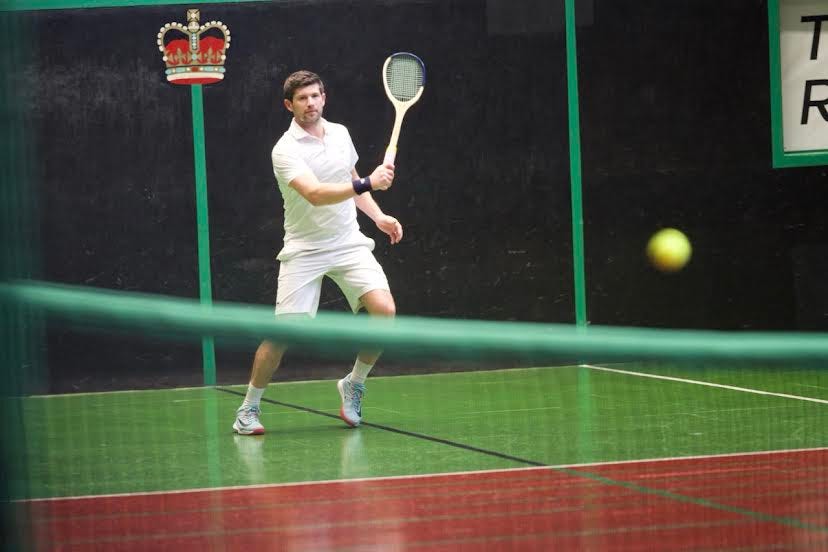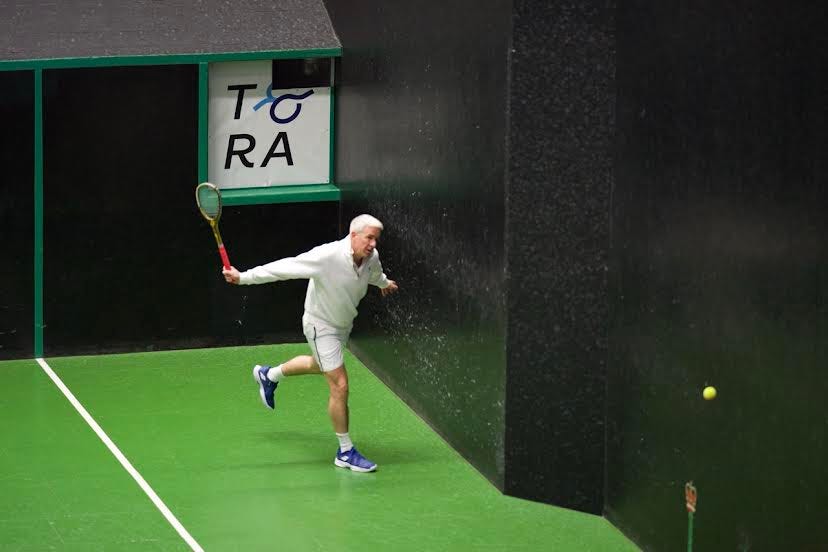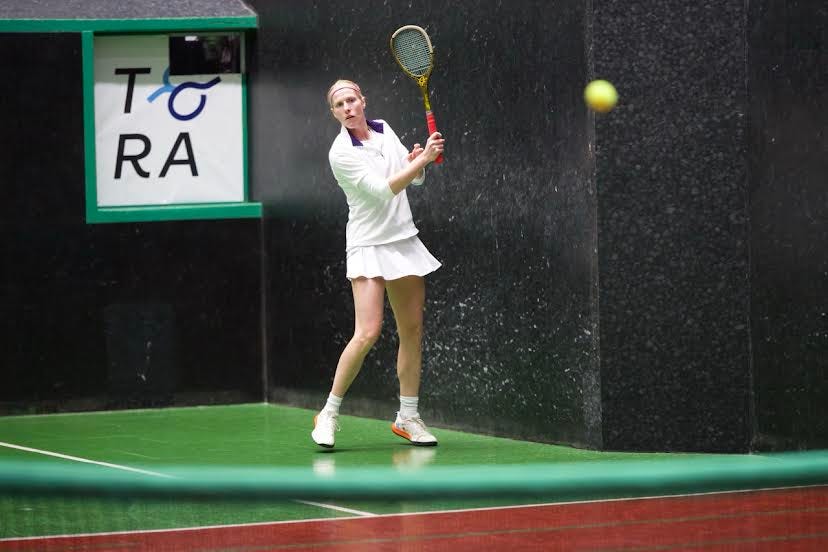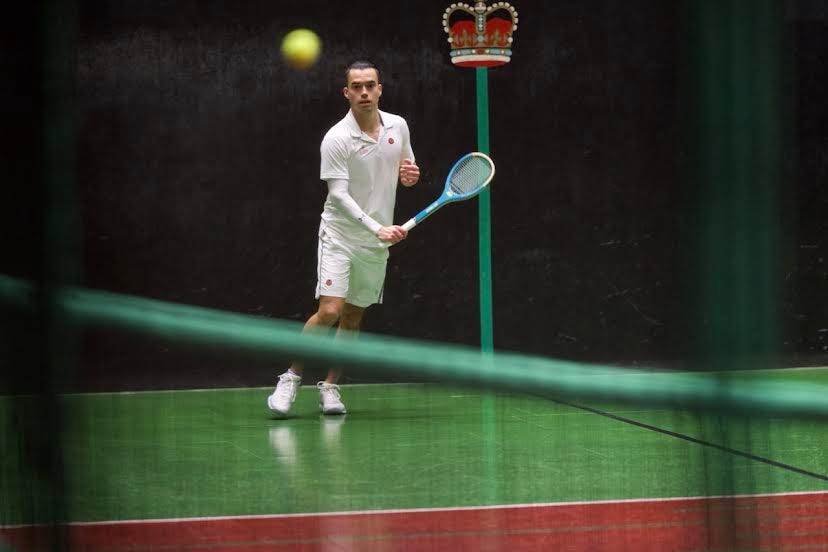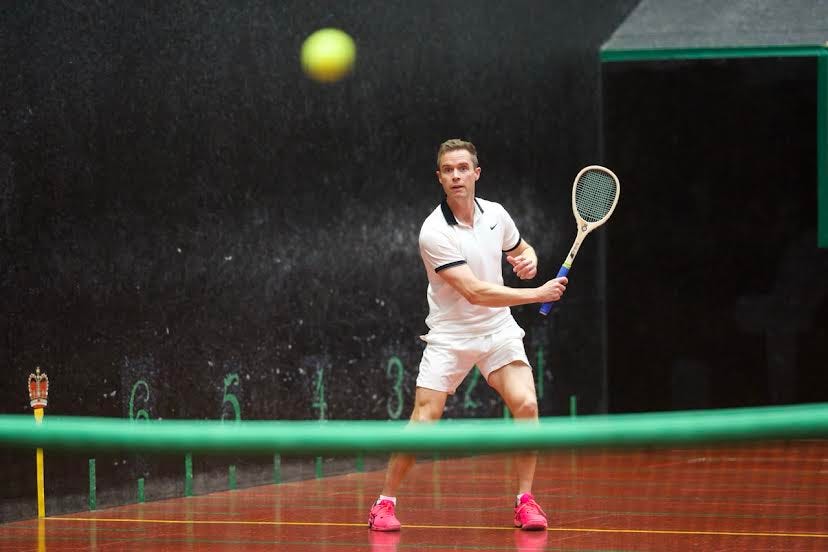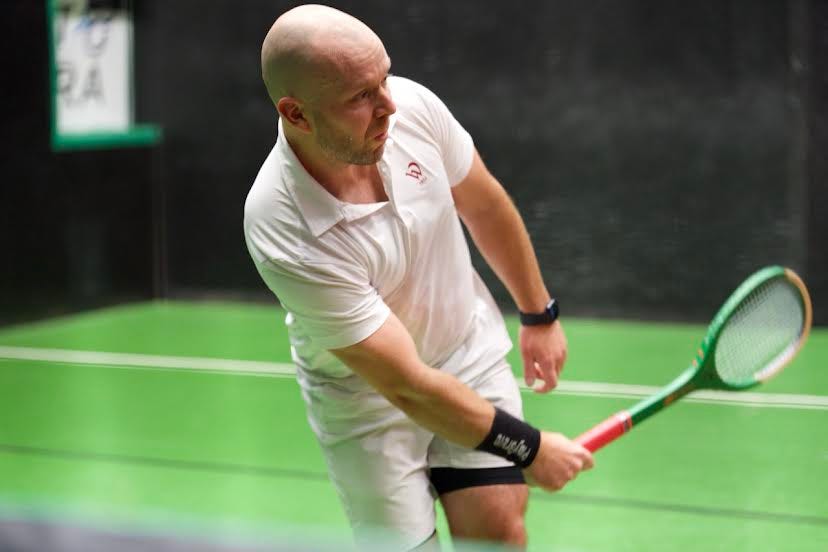Sayers foils Taylor-Matthews yet again at British Open quarter-finals
Fahey and Lumley breeze into women's singles final
Bryn Sayers has maintained his excellent head-to-head record over Ben Taylor-Matthews with a four set victory against the third seed at the quarter-final stage of the British Open at the Queen’s Club on Thursday. Meanwhile, Claire Fahey and Tara Lumley have locked in another chapter in their saga by winning their respective semi-finals in the women’s draw.
Play got underway at the early time of nine o’clock with the first of the women’s semi-finals between Georgie Willis and Tara Lumley. Lumley initially struggled to find a decent length on her serve, ceding the early advantage to Willis who took the first three games of the match. Lumley, wearing a brace on her knee, seemed hesitant to chase balls deep into the corner and was slow off the mark when moving around the back of the court. A big upset looked to be growing in likelihood before Lumley started peppering balls at the dedans. They were not high pace, but deadly accurate instead, hitting the centre of the T&RA racquesand logo every time. She hit five grilles in three games to bring the set back to 3-all, and though Willis was able to take the set to 4-all, Lumley was in the ascendancy. Willis saved three set points, but Lumley beat two chases on the floor to take the set.
The second set was a battle of the service end. Both players were serving a lot of drag serves, keeping the ball low on the penthouse and making returning on the volley difficult, with Lumley winning a couple of clean aces. By now, the rallies were getting longer, but Willis was unable to fully engage in a backhand exchange, instead pressuring Lumley down the forehand side. Lumley was hitting an excellent length, averaging hitting chase 4 through the entire match and with every third ball struck from the hazard end resulting in a chase. There was a long deuce game at 3/2 which was won by Willis, but Lumley pressed back straight away with a game of her own to love. By the end of the match, she was hitting her best tennis finding a brilliant line and length, securing her place in Saturday’s final.
The open quarter-finals began with second seed Nick Howell playing against qualifier Will Flynn, the latter being the first qualifier in a minimum of two decades to go so deep in the British Open. The two last took to the court together in the first round of the French Open two months prior, in a match where Flynn failed to win a game. He was determined to do better this time around and was playing the best tennis of his life, having dropped 5 handicap points since the start of the week. He was unafraid to play his shots against the World Number 3, unleashing his force while also playing purposefully into Howell’s backhand. But Howell was more than seasoned enough to see off the threat, turning the tables from defense into attack at the blink of an eye. Flynn managed to break through midway in the first set, earning the game that had eluded him in Paris. Yet he was often unable to deal with the force coming back at him as hard or harder than he hit his own. Howell’s play was exceptional, maintaining a very deep length on the court while still maintaining rapid pace. Howell wrapped up the match in little over an hour.
Occasionally, as is often the case in Ashes cricket, the first ball of a match can tell a story, and so it did in the second quarter-final between Robert Shenkman and Robert Fahey. Shenkman, with all of the confidence from having been the victor in their last outing, watched on as Fahey whipped a behind the back shot off the tambour, his racket speed astonishingly quick, as if in defiance of Shenkman’s Real Tennis Flair Instagram account. Shenkman then dumped the follow-up ball in the grille and it was game on. Fahey was all out attack, with Shenkman mustering as good a defense as he could. The opening phases were played out to a draw, but Fahey started to go up through the gears after reaching 2-all. Of note was their ability to hit gallery chases: Fahey repeatedly finding the last, but with Shenkman usually putting more into the second. The result being that Fahey always had more options when playing off the chase while Shenkman generally found his drive nullified.
Fahey ran away with the first set, and didn’t look back in the second either. He exhibited extreme control of the ball off his strings, managing the pace, length and spin expertly while Shenkman was doing all he could to stay afloat. Fahey’s target hitting was exceptional as he moved through the second set without Shenkman causing much grief. Only at the start of the third set did Fahey finally relent, with Shenkman stealing the first two games. Fahey then put his training jacket back on to deal with the frigid temperatures on court at Queen’s, taking a back seat for the rest of the set in order to focus his attention on the fourth. Shenkman never stopped fighting, however, maintaining his golden retriever energy throughout the match. He took the third 6/3 setting up a close battle for the fourth.
The true battle of the match was in the fourth set, as Shenkman’s defense was at full strength, even able to turn the tables and put Fahey under pressure at times, while Fahey’s attacking rigour didn’t quite have the effect it had in the second set. The games were even all the way through. Aside from Shenkman winning the first two games, neither player would have more than a game’s advantage until Fahey was 5/4 up. The former World Champion’s ultimate release valve was his shooting for the grille, using it to great effect whenever the rally became too long. He was eager to reach the finish line, shaking his racket in appreciation of his good shots and letting out a few “c’mon”s — a rare thing for Fahey. Shenkman saved the first match point in the 5/4 game with one of the rallies of the match — Fahey barely missing the winning gallery to his great disappointment. He would win a few moments later, beating two chases by slotting balls into the hazard galleries, securing his place in the semi-finals.
The women’s second semi-final was another rematch from the French Open in September, with the two finalists from that occasion Claire Fahey and Jess Garside resuming battle. As per the Flynn-Howell match, Garside had failed to take a game in that match, and was eager to put that to rights at Queen’s. Her best chance came in the first game of the match as she was able to earn a couple of game points against the World Champion. However, she was not able to convert either, and from that moment on Fahey’s play was faultless. Try as she might, Garside couldn’t find points anywhere on the court, winning just two points in the second set as Fahey marched on to another Open final, one step closer to her 48th Open title.
The open matches resumed with the third quarter-final between Levi Gale and first seed John Lumley. Gale was not intimidated by the higher ranking of his opponent, taking the game on from the start. Gale was putting in some incredible shifts in his retrieving, able to deal with a lot of what Lumley had to throw at him. But he was never really able to find any counter-attacking options, with Lumley having plenty of time on the ball to send Gale diving at yet another corner. Gale’s best run came mid-way through the second set, where he pulled back a 1/4 deficit all the way to 4-all as Lumley stalled out slightly. But Lumley recognised the danger and kicked up a gear again, winning eight straight points to close out the second set. The third set saw entertaining and high-quality rallies and plenty of dedans hitting from Gale, but Lumley was always in control. He completed his straight sets victory in a little under an hour and a half.
The last match of the day was between long-term friends, rivals and doubles partners Bryn Sayers and Ben Taylor-Matthews, competing against each other for the 36th time in their careers. There were to be no secrets or surprises; just a mano a mano battle of skills and temperaments. Though Sayers experimented with a couple of alternatives, he quickly settled on the high serve as the main way to make progress against Taylor-Matthews. Taylor-Matthews was playing calm and confident tennis, forcing well and getting the better of the backhand exchanges as he won four straight games from 1/2 down to 5/2 up in the space of ten minutes. He was so relaxed that he willingly served a double fault in good sportsmanship to rectify a not-up call on Sayers a few moments prior. He soon saw two set points in the 5/2 game, which Sayers defended with some tight backhand retrieval. Sayers bounced back as his retrieving hit its zenith, while his shots mopping up mishits into the winning gallery from the front of the court were exceptional. He pushed the set all the way into a deciding game, with Taylor-Matthews not getting close to another set point until the decider itself. Sayers had to save the set by beating better than 3, which he did with ease on the cut-volley. Moments later, Sayers had a set point of his own which he did convert off a volley error from Taylor-Matthews.
Though the statistical scorecard for both players was nearly identical in the first set, it was anything but in the second. Taylor-Matthews fell behind immediately, as Sayers cleanly mopped up anything he could from the back of the court with some notable down-the-line forehands proving a highlight. Towards the end of the set, his heart wasn’t in it, as exemplified by his serving a caterpillar serve as a Hail Mary.
The play tightened up again into the third set. Taylor-Matthews’s brief successes with his power game shook him back to life as he earned a two game lead early in the set. The rest of the set was all about holding on for dear life against an opponent with ruthlessly effective retrieval, barely showing evidence of the hip operation that took him out of the previous season. Sayers’s play barely altered, stoically fighting for every point as he brought the set back to 5-all. Taylor-Matthews earned the first two points of the final game with good balls under the tambour, before bringing up set point as Sayers whiffed at a ball low in the forehand corner and framed it directly into the marker’s forehead in the dedans. Taylor-Matthews wasn’t going to miss an opportunity to win a set again, blasting two on-target forces to beat a better than half a yard chases and halve the deficit in the process.
Sayers — at least externally — appeared unperturbed by having to play a fourth set and carried on with his business. He did, however, take umbrage with the disturbance caused by some rowdier members of the upper galleries at Queen’s, giving them a rather unimpressed telling-off. It didn’t affect his play, though, as he slammed ball after ball underneath the grille putting Taylor-Matthews’s world-renowned backhand under examination. Sayers was in complete control of the match, with Taylor-Matthews unable to win a game after 1-all in the fourth set. Sayers moved on to face Lumley in the semi-finals.
Play continues on Friday again at the earlier start time of 9:00 AM with doubles action, namely, the four open doubles quarter-finals and the two women’s doubles semi-finals, with the singles tournaments to continue on Saturday.
Match results:
9:00 AM: Georgie Willis (3) lost to Tara Lumley (2) 4/6 4/6
10:30 AM: Will Flynn lost to Nick Howell (2) 1/6 0/6 0/6
12:30 PM: Robert Fahey (4) def Robert Shenkman (6) 6/2 6/1 3/6 6/4
2:30 PM: Claire Fahey (1) def Jess Garside (4) 6/0 6/0
4:00 PM: John Lumley (1) def Levi Gale 6/1 6/4 6/2
6:00 PM: Bryn Sayers (7) def Ben Taylor-Matthews (3) 6/5 6/1 5/6 6/1
Order of play for Friday (all times GMT):
9:00 AM: Alexandra Bryant & Araminta Oldham vs Jess Garside & Georgie Willis (2)
10:30 AM: Robert Shenkman & Leon Smart (4) vs Josh Dodgson & John Woods-Casey (6)
12:30 PM: Darren Long & Bertie Vallat vs Vaughan Hamilton & John Lumley (2)
2:30 PM: Claire Fahey & Tara Lumley (1) vs Alex Brodie & Nicola Doble
4:00 PM: Robert Fahey & Nick Howell (1) vs Ned Batstone & James Medlow
6:00 PM: Levi Gale & Lewis Williams (5) vs Bryn Sayers & Ben Taylor-Matthews (3)



